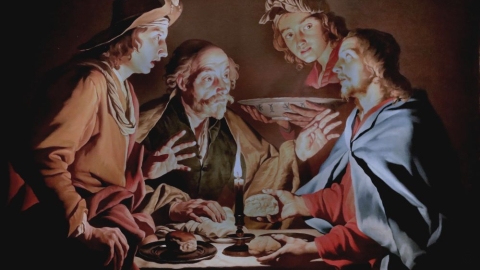The importance of choosing the right books

Good and bad books
It is man's greatness to know how to make good use of the Creator's gifts, just as it is a sign of his weakness to abuse them.
What could be more precious than the magnificent gift of speech, which by itself would be enough to ensure man's superiority over the entire visible universe? Speech! It is the expression of thought, the link between intelligences, the primary condition of teaching and social commerce, the instrument and vehicle of truth. But what becomes of the word in the mouth of one who uses it to propagate falsehood or vice? It confuses minds, agitates multitudes, arouses passions, corrupts and kills souls. While wisdom flows from the lips of the righteous, labia justi erudiunt plurimos, the tongue of the wicked distils poison, venenum aspidum sub labiis eorum. And if nothing is more effective than the word of God to strengthen virtue, vivus sermo Dei et efficax, doesn't the Apostle remind us that "evil words corrupt good morals", corrumpunt bonos mores collaquia prava? This is what the Wise Man was already saying, when he showed speech to be an instrument of life or death, mors et vita in manu linguae, depending on whether it is used for good or for evil.
And writing, that marvellous art which, with the help of a few signs, enchains speech and fixes thought, what help is it not to preserve true doctrines and transmit them from one generation to the next? It is through this medium that the centuries are linked together, and that the entire past of the human race is brought to life before us. It is through this medium that we can go back to the beginning of time, to gather from age to age, along with the lessons of human wisdom, the precepts and teachings of God. But how often has this powerful auxiliary of truth and virtue become a means of propagation for error and vice? And if, thanks to writing, holiness and true science survive in immortal pages, will not the evil book also remain open before the eyes of generations to come like a poisoned spring, from which lies and corruption will flow ceaselessly to mislead intelligences and wither hearts?
Man, then, has the power, which is both his strength and his infirmity, to make good use of the Creator's gifts, or to divert them from their true destination. And so, Our Dearest Brothers, when we criticize abuses or condemn excesses, it is never to the regular and legitimate use of things that our complaints and reproaches apply. Is there any discovery more admirable and useful in itself than that of the printing press, that providential complement to speech and writing? And did it not seem that, by lending wings to truth, so to speak, this new art would ensure its triumph throughout the world? No doubt, and it should not be forgotten that God's book, the Bible, was the first to emerge from these nascent presses, as if to mark them with the seal of divine consecration. But it was easy to foresee, according to the course of all things human, that this invention, so favorable in itself to the progress of truth, would soon become a powerful weapon in the hands of error, and that bad books would multiply with the good. Not even a century had passed since the introduction of this new and formidable element into public life, when the holy Council of Trent was already alarmed by the spread of so many pernicious writings; and the solemn warnings that the august Assembly issued to pastors and the faithful, either to excite the zeal of some, or to turn others away from dangerous reading, show the extent to which the ravages of the bad press were already preoccupying the powers of the Church.
Need I add, Our Dearest Brothers, that since that time, the peril has only worsened day by day? To the means of dissemination previously available to error, our century has added a new one, faster and more extensive than all the others. As long as people confined themselves to reading books, the spread of evil was confined to a fairly small circle. This sphere of action has been enlarged since, alongside the book, which is only read by a small number of people, we have imagined the light, daily paper, accessible to all, summarizing day by day the news from all over the world, and taking advantage of that attraction of curiosity so natural to man, to deal with every possible question, in haste and as if by play, with nothing escaping the hazards of a discussion that touches on everything from the highest truths of religion to the smallest details of domestic or social economics. By thus penetrating the habits of life, where it has managed to carve out such a large place for itself, the newspaper, since it must be called by its name, has become a considerable force for good and evil alike; and we run no risk of exaggerating when we say that there is no more powerful lever than the press for stirring up the multitudes and setting their interests and passions in motion.
But let's leave it to legislators and statesmen to reconcile the advent of this new power with the stability of the civil order. For us, what concerns us, and what we are entitled to appreciate, is the role and attitude of the press towards religion. Certainly, we cannot praise too highly the courageous writers who are constantly in the breach to defend our holy beliefs against the attacks of heresy and incredulity: they fulfill, in the press, a true apostolate; and it is an act of devotion to religion to support and spread the sheets in which they serve the interests of the faith with as much zeal as talent. Equally deserving of our gratitude are those who, while believing that religious controversies would be better placed in books, nonetheless profess a sincere respect for the rights of the Church, and who, in the defense of the great principles of the social order, deploy an activity and vigor worthy of such a cause. If the function of the press were thus understood by all, we would not dream of being moved by an institution whose advantages would easily outweigh its disadvantages.
But this is not, Our Dearest Brothers, the character nor the aim of that part of the press against which we seek to guard. What it pursues, what it strives to achieve, is the destruction of the Catholic Church, its doctrine and its institutions; it has no other raison d'être. Certainly, the work of Jesus Christ is above such attacks: neither lies nor corruption can prevail against it; but what is not indestructible is the faith of individuals, which can be mortally wounded by the errors disseminated every day among a public generally made up of uneducated men, and therefore incapable of resisting indefinitely the perpetual assault made on their beliefs and morals.
By Bishop Freppel
Text extract from Lettre Pastorale sur la presse irréligieuse, published February 8, 1874.



